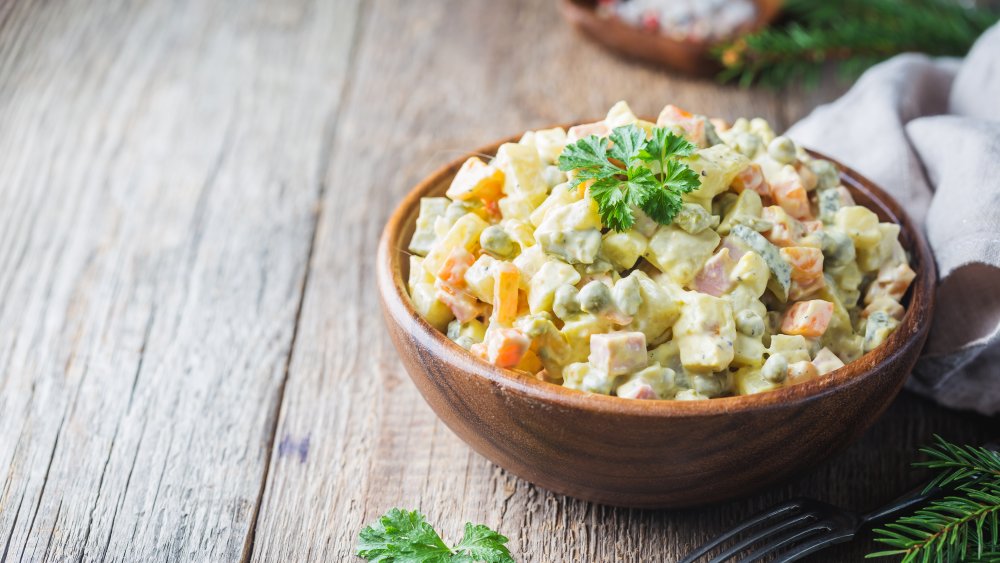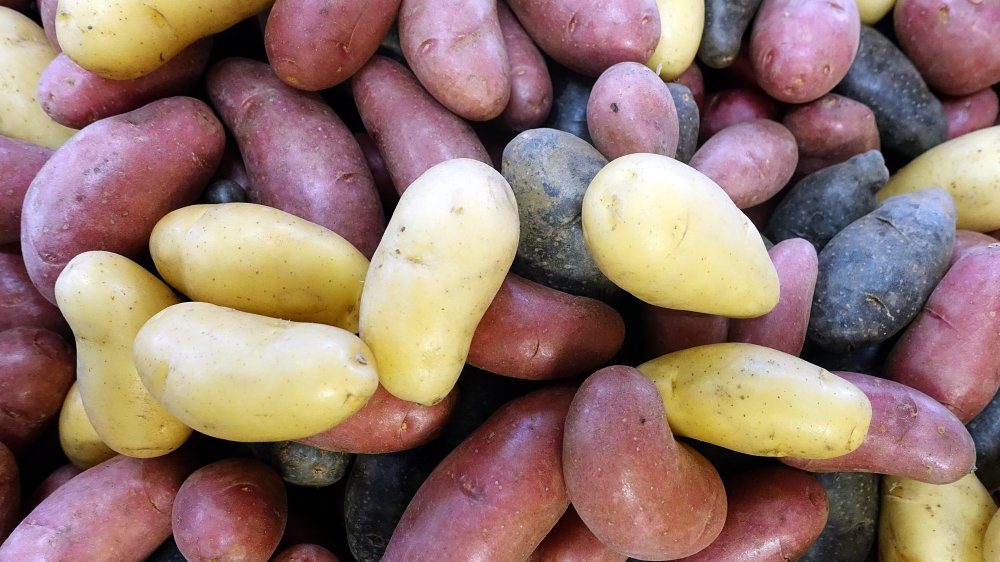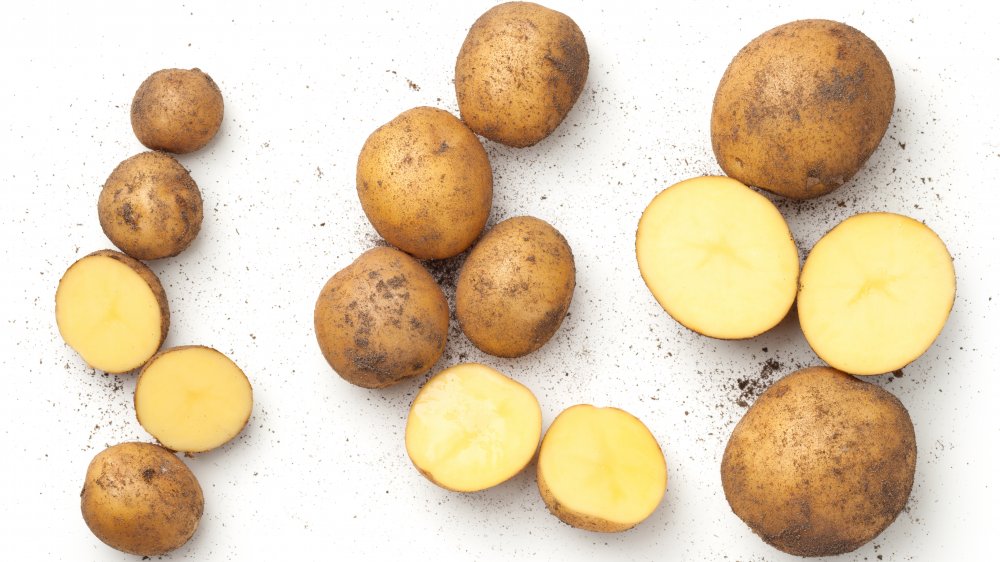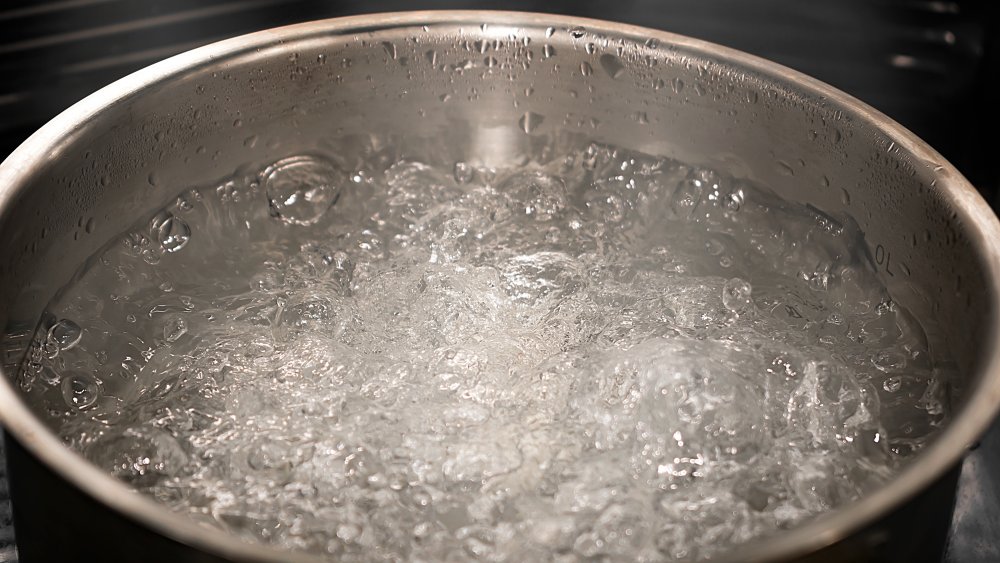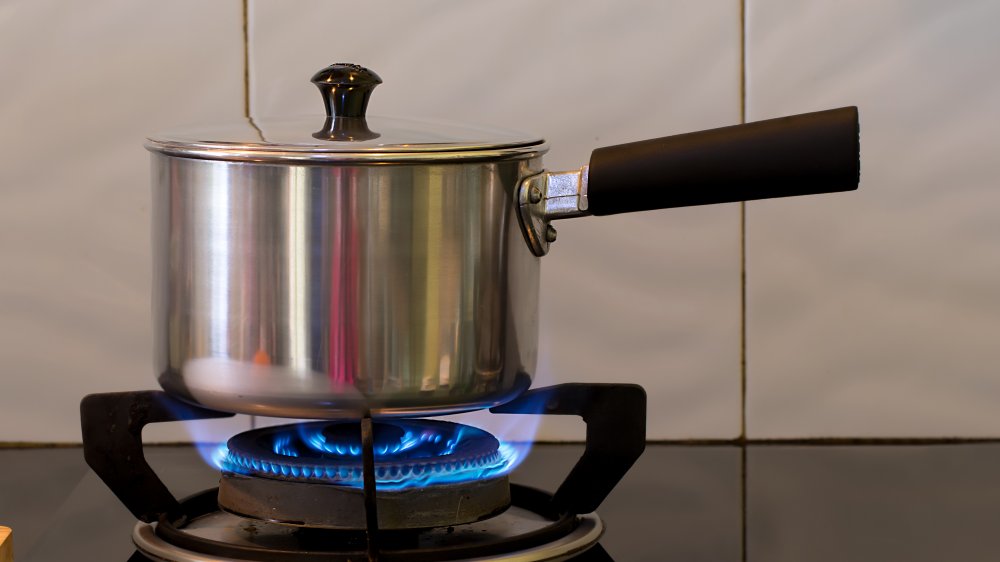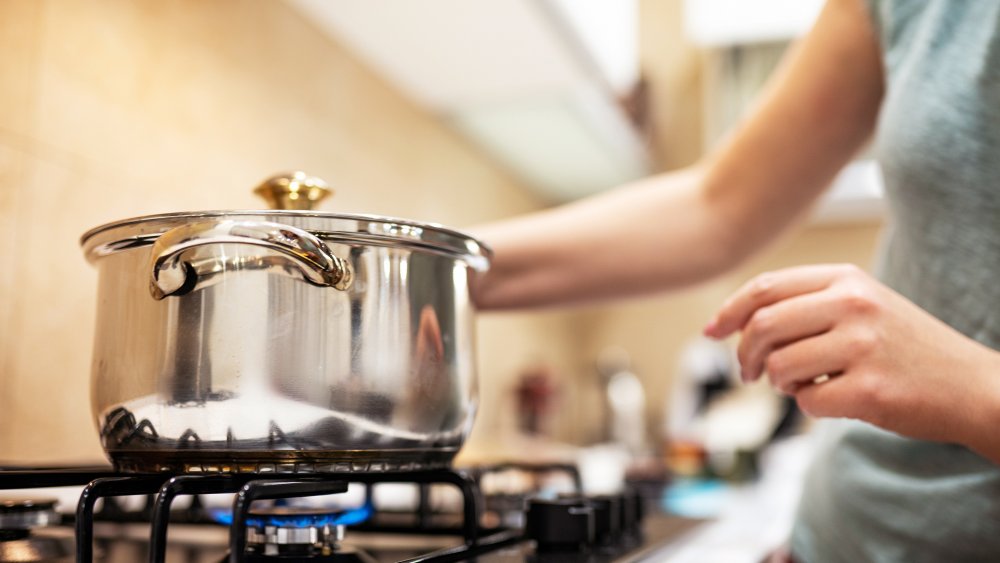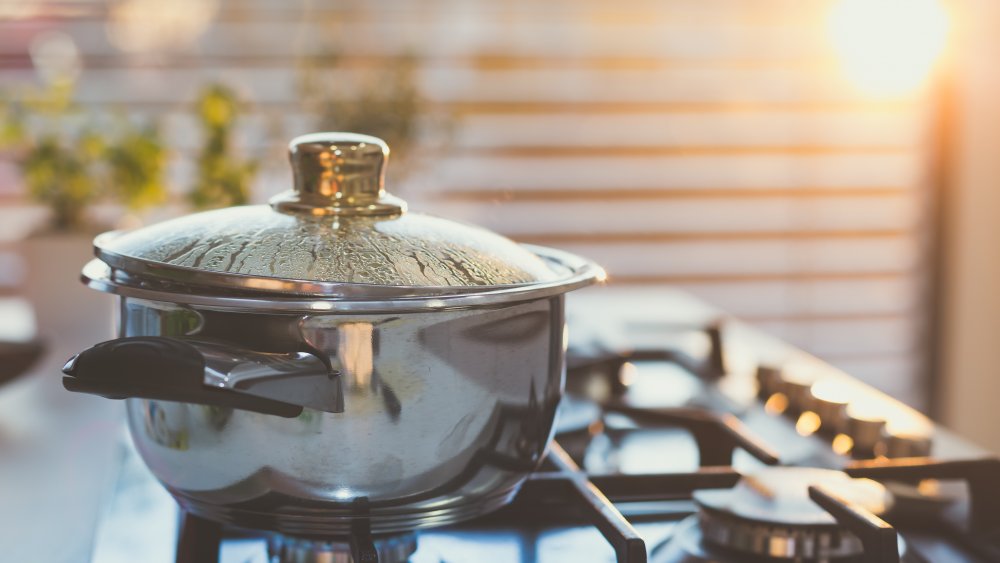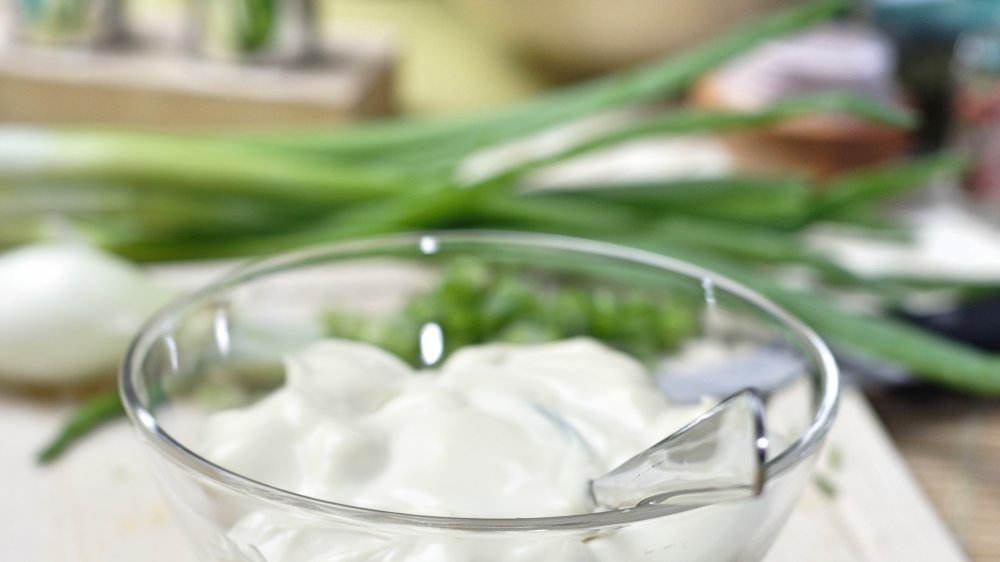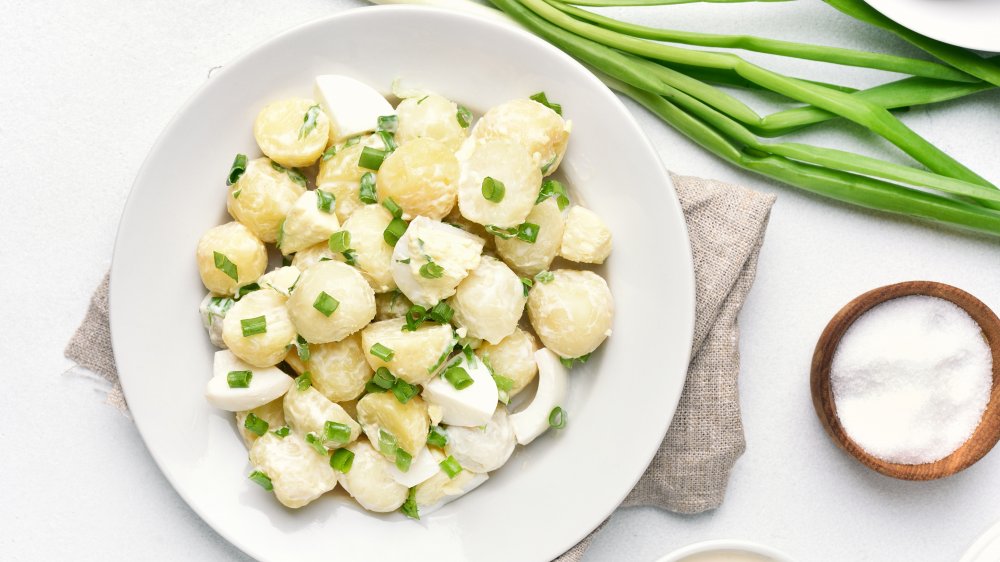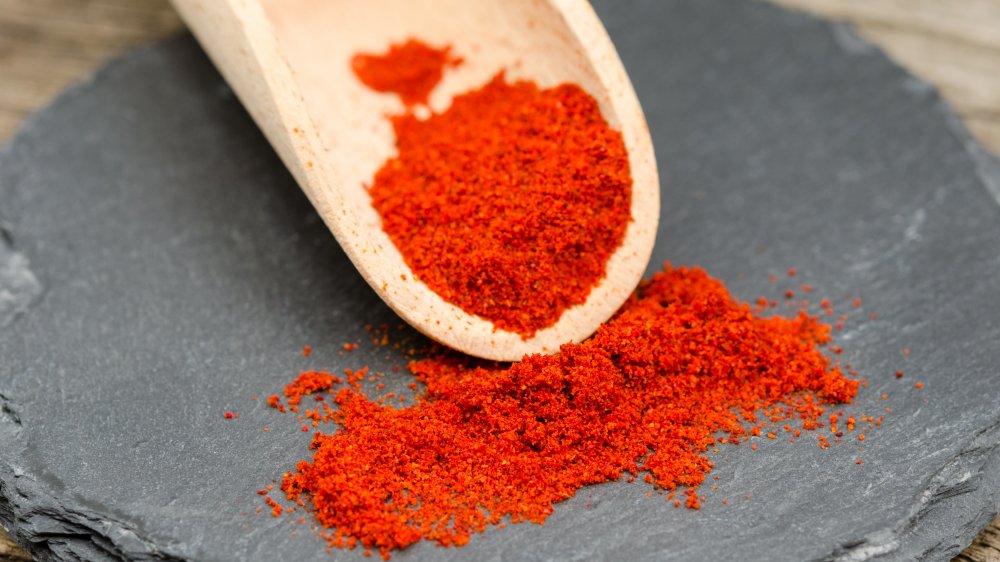Mistakes You're Making With Your Potato Salad
Once summer hits, it's beach parties and backyard barbecues. And while summer often means a lot of time spent outside with friends and family, it also means there's plenty of delicious summer food to be had.
Dad's barbecued ribs may steal the show for Saturday night dinner, or your sister's new Jell-O dessert recipe may be the talk of the summer pool party, but there's one dish that still doesn't even hold a torch to other summer foods. Yes, we're talking potato salad.
Potato salad has been a staple for potlucks, picnics, and parties since the mid-19th century, as people added cooked potatoes to a bowl and mixed in all the fixings. And once mayonnaise came along in the early 1900s, potato salad was made with ingredients such as mayo, mustard, vinegar, celery, eggs, and onions. Every recipe is a bit different, and often, they're tried and true family recipes that have been passed down for years. And while there isn't necessarily a wrong way to make potato salad, especially if you're following your mother's award-winning recipe, there are a few important steps to follow and several ways to enhance your potato salad to really make it shine. These are the mistakes you're making with your potato salad.
Choosing the wrong potatoes for your potato salad
As with any recipe, it's important to start with a good foundation. After all, that's the beginning of what you'll build off of to create a great dish.
For potato salad, it all starts out with the potatoes. Sure, you can probably achieve a decent potato salad by throwing russets in a pot and calling it a day, but as it turns out, some varieties of potatoes are way better for potato salad than others.
Choosing a type of potato that's a bit waxier such as red potatoes or Yukon golds will be your best bet from the get-go. These potato varieties hold their shape better when boiling, providing structure and texture for your salad, rather than the mushy texture a starchy russet will provide. Russets are typically our go-to potatoes for most dishes, but go ahead and save those for your mashed or baked potato nights instead.
Not cutting the potatoes all the same size for potato salad
Have you ever eaten potato salad and were just really impressed by the uniformity of the potatoes? Probably not, but it's worth taking notice next time. Potato salad truly can be a beautiful dish. After all, everyone is vying for the best recipe, so there might as well be some art to it.
But cutting up uniform potatoes for your potato salad isn't just for looks. It also helps to keep the texture and consistency of your potato salad stay right where you want it.
According to the Idaho Potato Commission, cutting your potatoes the same size before boiling will help with the cooking process. Since it's important to cook your potatoes properly so the starches don't break down too much, it's a lot easier to keep track of that happening with same-sized pieces. This will allow the potatoes to cook evenly, at the same rate, providing you with perfectly cooked potatoes to dive in and make your salad with.
Not seasoning the water when you cook your potatoes
When it comes to potato salad, you want a dish that's packed full of flavor. After all, that's the whole point, isn't it? Dishing up a bowl of chopped up, boiled potatoes that are lacking in flavor isn't going to get you very far. And part of adding great flavor to your potato salad requires you to start with your seasonings from the very first steps.
As you're boiling your cut potatoes, adding salt to your water will make all the difference. Because potatoes are starchy, they tend to suck in salt pretty quickly. The salt is soaked up by the potatoes throughout the boiling process, so making sure you're adding plenty of salt to the water for the flavor to follow-through is crucial. This will help to keep the seasoning intact throughout the boiling process and will perfectly complement the rest of your ingredients as you prepare your dish.
Not starting the potatoes in cold water when making potato salad
If you've tried and tried again to get your cooking method down for potato salad perfectly to no avail, this may be the trick you need. As it turns out, boiling your water on the stove and throwing your potatoes in to cook as you normally would with things like pasta, might just be hurting your end result.
To be sure your potatoes cook evenly and that the exterior doesn't cook too fast, start your potatoes off in your saucepan with cold water. Cover them by about an inch of cold water, and then turn on the burner. This prevents the immediate drop of the potatoes into already-hot boiled water and will make the consistency much better throughout. And of course, potatoes that are cooked the same on the inside as the outside make for a much tastier potato salad.
Not cooking the potatoes the right amount of time for potato salad
Just as it's important to choose the right type of potatoes for their starch levels, making sure they cook properly throughout the process is important as well.
For potato salad, timing is everything. You don't want to boil your potatoes for too short of a time so that they're still hard and crunchy, making your salad terribly unappealing. On the other hand, boiling your potatoes too long can lead to mushy potatoes that fall apart while you're mixing in other ingredients or potatoes that will fall off the fork while eating.
Of course, boil time will depend on your stove, but it will also depend on how large of chunks of potatoes you're boiling. Check throughout the process to see if they're done. According to Livestrong, the best way to check is by piercing a piece of potato with a fork for testing. If it pierces easily, remove your potatoes from the heat before they can cook any longer.
Boiling the potatoes for potato salad (try steaming them instead)
One of the biggest problems faced with potatoes being cooked for potato salad is the fact that water is being introduced to the recipe at all. Yes, the potatoes need to be cooked somehow, but because of the starch in potatoes, submerging them in water may not be the best route. As potatoes are quite porous, when they spend time in a big pot of water, they tend to soak up a lot of the water they're in.
With all that soaking, it makes it so potatoes retain water and may release it in the finished salad product, leaving you with a mushy end-result.
To avoid the potatoes being cooked in water at all, steaming may be a better option. Just like you do with broccoli, carrots, or Brussels sprouts, your potatoes can be steamed. Steam your potatoes to perfection in a steamer basket to avoid having your potatoes get too waterlogged down.
Adding dressing too soon when making potato salad
When we think of an incredible potato salad, it's normally because it has the most perfect texture. It's a bit creamy, with chunks of potatoes, and a bit of crunch. But if you don't make your potato salad correctly, you may be ending up with a finished product that's incredibly watery. And let's face it, nobody wants to try eating cold potato soup off of their plate during the annual summer cookout.
One of the major ways a potato salad ends up being watery is because your dressing of choice is added to the potatoes too soon. According to Kitchn, it's important to let your potatoes cool before adding any type of dressing, whether it's mayonnaise-based or vinegar-based. And if you're opting for a mayo base, be sure to consider the variety you're using. The Idaho Potato Commission says lighter versions of mayonnaise have the ability to turn to liquid quicker and easier than regular mayo.
Not adding extra mix-ins to your potato salad
First thing's first, potato salad is, indeed, a salad. It's not mashed potatoes with butter and milk, and it's not roasted potatoes with veggies mixed in. Potato salad is its own dish, and truthfully, the additional mix-ins added to a recipe can truly make or break it.
Once the potatoes are cut and cooked to perfection, and the dressing is added, there are so many ways to up the ante for your potato salad. Adding items such as chives, parsley, and onions can make a great difference in adding a ton of flavor, but it still keeps the salad feeling light. Other crunchy additions such as diced celery and pickles are also popular, adding another bit of texture and introducing a touch of tang. Many people also opt to add hard-boiled eggs diced up to really drive their potato salad recipe home.
Not adding paprika to your potato salad
Have you ever seen a big bowl of potato salad, just waiting for people to dive in, that's sprinkled with a bit of burnt orange powder on top? That's paprika, and it's definitely there for a reason.
First of all, it gives potato salad its classic, finished look just like it does for deviled eggs. But that's certainly not all paprika is good for. Paprika can sometimes be sweet, it can be spicy, or it can be smoky. Sometimes, it's a mixture of all three. But no matter the flavor it imparts, it's typically fairly mild.
The regular paprika you find in the grocery store is generally made from peppers from California or South Africa, and it provides the perfect subtly sweet, salty, and spicy hint on top of your potato salad. It finishes off the dish, giving it a great look with a hint of interesting spice.
Not waiting long enough for your potato salad to chill
Now that you've mixed your boiled potatoes with the dressing, and you've added in items like diced celery, pickles, and more, it's time to dive in, right? Well, not so fast.
Similar to pasta salads, or even some cream-based desserts, some dishes are just better once they sit in the fridge for a bit. Sort of like letting a steak marinate, potato salad needs some time for all of the ingredients to come together in the fridge.
When planning ahead for potato salad, consider if your recipe requires an hour in the fridge or a couple of hours. Often, a cold salad requires a bit of time because the flavor has the potential to change so much in the fridge. Plus, if you let it sit in the fridge for a while before serving, you'll probably be able to leave it out longer on the potluck table without any fear of food safety issues.
